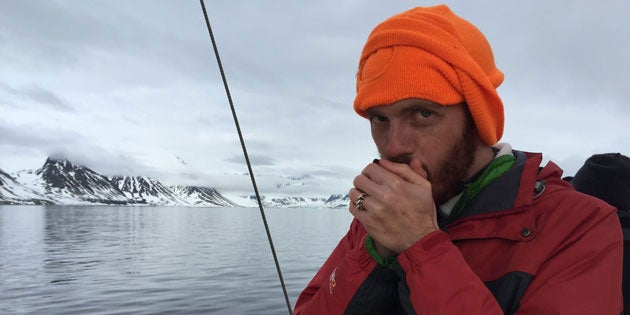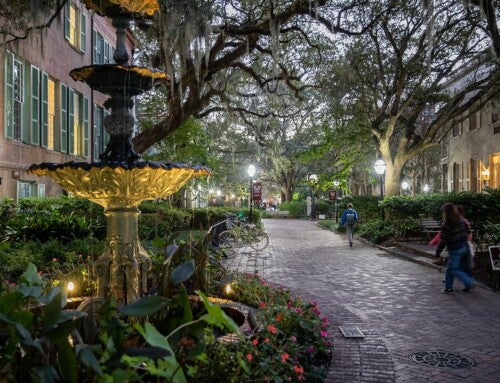Perhaps it’s all the time in the sun and heat down in Charleston that makes certain alumni of the College crave a change of scenery. As nice as the South is, we can understand the desire to head north, or out West, or even abroad.
But to head as far north as the Arctic Circle? Yeah, it might sound zany, but for writer and English major Alexander Lumans ’06 and a band of other artists and scientists, the Arctic is where true inspiration lies.
Following in the footsteps of photographer and fellow College alum Vanessa Albury ’01, Lumans spent part of his summer navigating glaciers as part of the 2015 Arctic Circle residency program. For nearly three weeks he and about two dozen colleagues lived aboard the tall ship Antigua, making near-daily excursions to Norwegian islands and glaciers. When arriving on solid ground (or ice), the assorted fellows got down to business. For Lumans, the observations he made after disembarking helped shape the setting for a his first novel, which involves a sailing crew encountering strange, climate change-induced phenomena in the Arctic.
“By focusing on a sailing crew instead of the environment, my novel will return the human element to the Arctic,” Lumans wrote as part of his successful Kickstarter campaign. “Understanding the humanness of a place is the first step to protecting it. I want to show others that the Arctic is not an inhumane place, but rather a rich and vivid region with much to teach us about ourselves and how we relate to one another.”
Wrapped in four layers of clothing and thick neoprene and rubber boots, Lumans would step out of the Zodiac dinghy that shuttled him to shore and, with journal and pen in hand, immediately look for a place to call his own.
“Alright, I’m off the boat,” he’d say to himself. “Where’s my rock, where’s my seat, where’s my perch going to be?”
On one trip ashore, Lumans found an empty hunting cabin. It was the stuff of dreams for the novelist.
“There was a desk and a chair and a window… I could have stayed there for weeks,” he says. “I felt like it was made for me.”
Indeed, Lumans warmed to the frigid Arctic world during his time aboard the Antigua, reveling in the breathtaking views of the forbidding and austere land- and seascapes that surrounded the boat throughout its journey.
“You think it’s going to a be a very hostile and austere setting, but it was a strangely really welcoming one,” says Lumans. “It’s very approachable as long as you understand what you’re getting into.”
Neither the cold nor the eternal sunshine seemed to dampen the writer’s spirits.
“My entire time there, I never saw the sun even approach the horizon,” says Lumans.
“It seemed like the sun was brightest at four in the morning.”
Lumans and his fellow travelers occasionally spied wildlife, including walruses and minke whales. During the summer solstice, the crew witnessed a polar bear mother and her cub feasting on a freshly-slaughtered reindeer.
Meanwhile, Lumans, tucked within the snug confines of his ship cabin, devoured the books he brought along, including Barry Lopez’s Arctic Dreams and the first book in Norwegian author Karl Ove Knausgard’s six-book series, My Struggle.
Now back home in Denver, Lumans has resumed work as a writing instructor at the University of Colorado Denver and the Lighthouse Writer’s Workshop.
He’s still working on his novel set in the Arctic, building on a body of work that already includes short stories about nervous newlyweds (published in TriQuarterly), a distraught vulture (SmokeLong Quarterly), and the bomb factory in his hometown (Guernica). Lumans was kind enough to allow the College to reprint his short story “Limes” below the slideshow.
[owl-carousel category=”Lumans” singleItem=”true” paginationNumbers=”true” autoPlay=”false”]
Limes
By Alexander Lumans
(Originally published in The Normal School)
Stage 0: A slight change in the air. Dogs bark to dogs. An outbreak of yawns around the dinner table. The Lowcountry summer digs into its July raze. In St. Michael’s cemetery, the father and the mother visit their son’s grave with paintbrushes and Atelier acrylics, respectively. Every Sunday they paint his headstone anew: the new bridge, horses, still life. They brighten last week’s colors. The father wishes a tree grew over the grave to keep off the rain. The churchbell rings once. He leaves for Rainbow Row, she for Shem’s Creek, divorcees. And this new breeze, from pluff marshes, navigates the city like a germ in the branches of Charleston’s arteries.
Stage 1: It’s colorblindness. Déjà vu in children as they yank on table runners. Their parents: “This is why we can’t have nice things!” On his porch, the father has a gin and tonic with a fresh key lime. If not for this one palmetto in his yard, he’d have a perfect view of the college sailing team mid-maneuvers. He thinks that he will always think of himself as a father—no matter what happens, think healthy thoughts.
The carriage tours’ horses’ shoes fall silent on the French Quarter’s cobblestone. Lit candles go out. Saltwater taffy sells out. Seagulls turn up their beaks at tripe handouts.
Stage 2: It’s cavities. It’s the air. Domesticated cats go feral. Children don’t recognize their mirrored faces. Runs on bandanas, Magnum condoms, antibacterial gel. People claim they only see the color blue. When the father goes in for his yearly prostate exam, the doctor asks him if he’s up to date on all his vaccinations.
“Smallpox?”
“Check.”
“Whooping cough?”
“Double check.”
“Rocky Mountain Spotted Fever?”
“Doc,” he says, “does this look like the Rockies to you?”
“Things have changed.” Doc’s at the window blinds. “Think I’d like to buy a ticket out of here. Somewhere nice; lots of fruit.” He fingers down a slat. “You know what they say.”
“Should I be worried?”
“A good doctor is always worried.”
The father calls the mother to say he needs to stay with her for a while—off the peninsula until whatever this is blows over—and she answers the phone with a “Look outside.” On his porch she’s standing, on the phone with him, with an overnight bag at her feet and fresh scratches bleeding down her ankles: “I watched a narwhale abandon her calf in the Creek. Have you seen the cats around here? Plain vicious.” She moves back in. Onto his bed she empties her bag of Pop-Tarts, Tupperware, and paint tubes. On the radio they call it the “Holy City Hots.” Aquarium sea turtles won’t come out of their shells. Bars are packed before noon: a drinking town with more than a basketball problem.
Stage 3: It’s dyslexia. It’s spits and fasms. It’s phantom limb syndrome: “I can feel an arm coming out of my chest. It’s squeezing a stress ball. But the stress ball isn’t there either.” Children run away en masse and gang up in the public library. The gulls won’t eat anything but Lobster Thermidor and Baked Alaska.
So shoot the gulls. Use slingshots, nailguns, fireplace mantle Enfields from a long-gone battlefield. Roast them in the streets over pitfires. From the Battery, a man fires paintballs at the swooping flocks. Windows latch. Gates lock. Sandbags line porches. She guards her Temples, Customs, and Laws. Call it “Chucktown Colic.” People see blue, yellow.
“Have another gin and tonic,” says the mother. “Have a hundred more.”
“We don’t have a hundred limes, dear: we don’t even have one.”
Packs of terriers and pugs are released to curb the booming feral cat population. A baby’s first word is “maleficent.” Somehow, the mail keeps coming in the doorslot and donations to the Red Cross skyrocket.
Stage 4: It’s scurvy. It’s tennis elbow. It’s jaundice. It’s necrotic encephalitis. They turn St. Michael’s into a crematorium and there bulldoze the pet carcasses. “Mt. Pleasant Miasma”; outside air, they say, is bad. So close the bridges. Line 17 with roadblocks and barbed wire and crucifixes. For key limes the father searches obsessively riverside, claiming a Vitamin C motive. Astraddle the channel, the new suspension bridge resembles a Holter monitor’s readout: two sharp heartbeats, and then a flatline into the coast.
He detours, abruptly, away from St. Michael’s—the waxy, sulfurous smell of burning hair—through the Market.
Corner artists sell still-wet portraits of Spanish moss, fruit trees, lone palmettos. He buys one. Charleston Candy Kitchen hands out samples of the newest taffy flavors: “St. John’s Wort” and “Panacea.” On the menu board at T-Bonz are tacked up pictures of Missing Persons. There, a photo of a boy sorting baseball cards. He stares for a long time; “Even back then, I looked like a father.” There, hundreds more like him.
At home, he’s forced to wait an hour—“You act like I’m already sick.”—for her to pull the nails out of the freshly boarded-up door.
“You didn’t say you were coming back.”
“I was; I am.”
“How do I know you’re not infected?” she asks. “You smell like dog-smoke.”
“Think healthy thoughts,” he prescribes, then hands her the painting of a rain-streaked lime tree and keeps the taffy for himself.
Aquarium sea turtles abandon their shells. Blue, yellow, and now pink.
Stage 5: It’s impotence. It’s SIDS. It’s paralysis, it’s seizures, it’s death. One last tour through the French Quarter on carriage-turned-hearse. The crematorium’s no longer “domesticates-only.”
Sunday, the father and mother visit St. Michael’s cemetery. They’ve wrapped bandanas over their noses and mouths and ankles. She: paint tubes; he: brushes. Behind the far pierced brick wall, runaway children stand on library copies of Gray’s Anatomy to watch. Their faces are painted like unearthly rain: blue, yellow, pink, bright green. The churchbell rings thirteen times. He smells citrus. The slightest change in the air indeed.
She squeezes out one paint tube after another, but to him, they’re all damp gray. She asks, “Do you think it makes a difference how it started?”
The children’s faces, too, suddenly color-drained. He looks away, down at a shaded grave crowned with the state seal.
She says, “I always thought it would be water.”
“We’re below sea level,” he says, “but not for long.” He sticks his hand in his pocket for a brush but pulls out melted gray taffy instead. He thinks, can only think, of that painted tree in the rain. And only in the thickest branches of his brain is it still heavy with limes, which, too, he’s afraid, will quickly fall and fade. “Even the graveyards are rising. Just pile the new bodies on the old ones.”
“You mean us.”
“Aedes Mores Juraque Curat.”
“So that’s how cities work.”
The father stares at his hands, then back at the children. He pretends to pull down a single blind slat. “I’d like to buy a new one, I think.”
“The Market doesn’t sell boys.”
“A city.”
“I should’ve never pulled out those nails.”
“Somewhere fruity,” he says. “I’d donate it.”
“No one wants a city. Not a fruity one, and not like this.”
“I’ll give it to a charity”—he licks linty taffy off his fingers; what he misses most is bright green—“for people like us.”
The children leave, chasing with horseshoes a passing ‘dozer.
“You’ve got some gull in your teeth, dear.”
“You know I’m deadly with a nailgun.”







